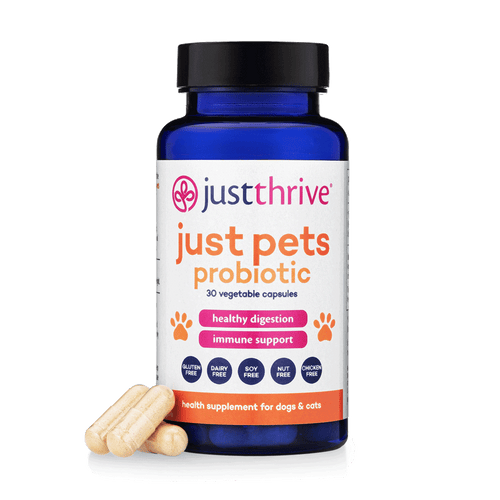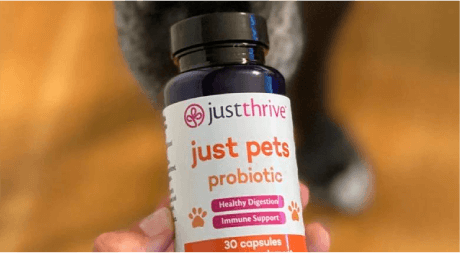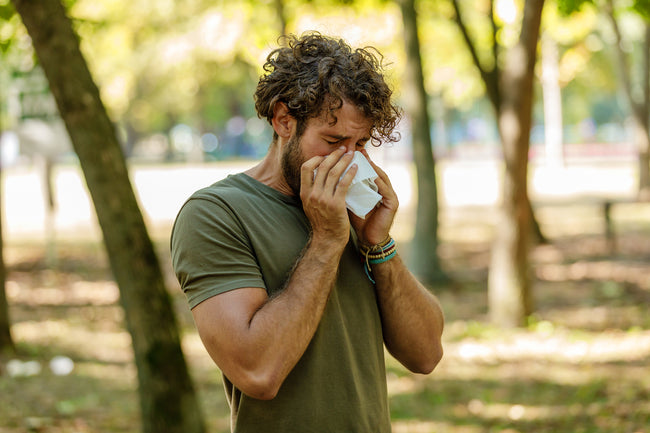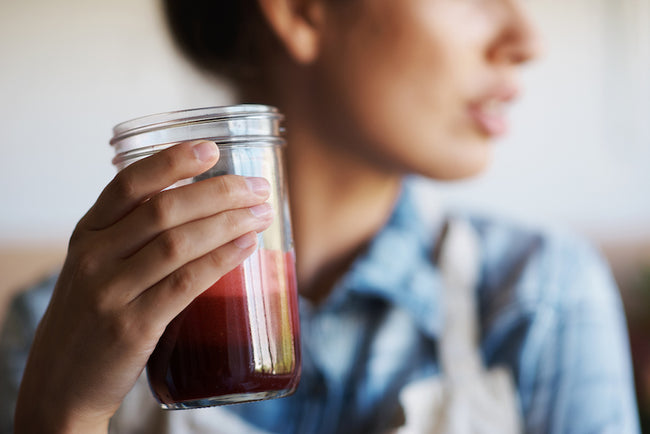Every time you eat, those puppy dog eyes watch you. Your pup acts like he’s/she’s starving… like you never feed them… and begs for something off your plate.
It’s hard to resist that beloved face. And because you love your pup, you naturally want to give them a tiny piece… or let them lick your plate clean.
Before you do, though, make sure you know which foods are completely safe, which cause stomach upset, and which can be hazardous to your precious furry friend’s health…
Because for a healthy and happy dog, you want to keep their gut as healthy as it can be.
Know the Absolute NOs
While there are plenty of foods you and your pooch can safely share, there are some that can cause grave consequences. Make sure to never give your dog foods from this list (1) ––
- Chocolate contains compounds called methylxanthines which are toxic for dogs. Even small amounts of chocolate – especially if it’s dark chocolate – can bring on vomiting and diarrhea. And large amounts could cause heart problems, seizures, or death.
- Mixed nuts contain high levels of fats and oils, too much for your dog’s digestive system to manage. They can cause vomiting and diarrhea as well as a potentially deadly disease called pancreatitis.
- Macadamia nuts particularly are among the most dangerous foods for dogs. They can affect your dog’s nervous system, cause intense vomiting, increase your pup’s temperature, and make your dog unable to walk.
- Salted almonds increase water retention, which can be fatal for dogs with heart disease. That along with the high concentration of fats make these a definite no for your fur baby.
- Grapes and raisins can cause kidney failure in dogs, though veterinary scientists don’t know exactly why.
- Dairy products contain lactose which can’t be properly broken down by your dog’s digestive system. Dogs don’t produce much lactase, just like people who are lactose intolerant. Giving your pup milk, cheese, and other dairy products can cause excessive gas, abdominal pain, diarrhea, and vomiting.
- Xylitol, a sweetener often found in candy, gum, and baked goods – can cause your dog’s insulin levels to increase leading to dangerously low blood sugar levels. That can cause symptoms like vomiting, sluggishness, loss of coordination, and seizures – all signs of liver failure.
If you even suspect your dog has ingested any of these dangerous foods, contact your vet immediately or call the ASPCA Animal Poison Control Center at 888-426-4435.
While the foods above can cause immediate harm to your dog’s health, the list doesn’t end there. There are many other people foods that can knock their gut out of balance, causing slow but steady damage that could have serious consequences.(2)

These People Food Will Upset Your Dog’s Stomach
Just like us, some dogs have cast iron stomachs while others get sick from even the smallest taste of something new. People foods that are most likely to upset your pup’s gut include:
- Citrus fruits, including peels
- Salty snacks like chips and pretzels
- Onions and garlic
- Raw yeast dough
- Beans and peas
- Corn
- Soy products
Any of these foods can cause imbalances in your dog’s gut microbiome. And that can lead to health problems far beyond their digestive system.
For a deeper dive...
Check it out for yourself HERE
How an Unbalanced Gut Affects Your Pup
Your dog’s gut microbiome contains trillions of bacteria. When their gut is in healthy balance, beneficial probiotic bacteria greatly outnumber harmful pathogens.
Unfortunately, it’s easy to knock that microbiome out of balance, especially if your dog has eaten people food.
When their gut falls out of balance, a condition called dysbiosis, pathogens outnumber probiotic bacteria. And that can cause all sorts of GI (gastrointestinal) problems like extremely smelly gas and diarrhea… along with other seemingly unrelated and troubling symptoms.(3)
Dysbiosis can cause far-ranging symptoms like:
- Itchy skin
- Allergies
- Unusual weight changes
- Bad breath
- Low energy
- Depression and anxiety
- Leaky gut
That’s because your dog’s gut houses more than 70% of their immune system, which means dysbiosis can throw off any system.(4)
Luckily, there’s an easy way to keep your precious pup’s gut microbiome in healthy balance: Give them probiotics every day.(5) Because a healthy well-balanced gut microbiome delivers countless health benefits for your dog.

Healthy Gut, Healthy Pup
With a balanced gut microbiome, your dog will enjoy abundant good health. A healthy gut optimizes digestion and nutrient absorption, keeps the digestive system working like it should, and supports a broad range of additional health benefits. That includes being able to quickly bounce back after getting into people food that can cause an upset stomach.
Equally as wonderful, a healthy gut microbiome supports:
- weight management
- strong bones
- comfortable joints
- healthy teeth and gums
- shiny coat
- proper immune system responses
- healthy skin
- puppy-like energy
A healthy gut will even affect your dog’s well-being, including how they feel and behave.(6) So to keep your pup feeling happy and healthy, start by supporting their gut microbiome with a daily dose of high quality probiotics.
How To Choose The Right Probiotic for Your Dog
Dog’s guts are different than people guts, and that means they need different probiotics than you do. So you’ll want to use a probiotic supplement specifically formulated for a pet’s microbiome. Scientific studies show that giving specialized probiotics to your dog can help easily maintain a healthy balance of gut bacteria.(7)
Two probiotic strains in particular showed overwhelmingly positive results when it was put to the test in dogs suffering with diarrhea and vomiting.
Researchers tested a dog-focused supplement containing the special probiotic strains: Bacillus subtilis and Pediococcus acidilactici. The study included 11 dogs, some healthy and some with GI distress. Each dog got this probiotic supplement every day for 30 days. And the results were near life-changing:(8)
- GI issues were dramatically decreased or disappeared entirely
- Gassiness was reduced in even the healthy dogs
- No healthy dogs experienced adverse symptoms
That’s why you want to make sure your dog gets the right probiotic… one designed to work with the bacteria naturally found in their gut microbiome.
Just Pets Probiotic Keeps Your Dog’s Gut Happy and Healthy
Dogs get into everything. That includes occasionally getting into people food that they shouldn’t be eating.
Just Pets Probiotic helps keep your dog’s gut happy and healthy, even if they’ve managed to grab a piece of bread or cheese cube off the counter.
It’s powered by two targeted probiotic strains - Bacillus subtilis and Pediococcus acidilactici - known to be effective for keeping your dog’s gut comfortable and healthy. Sprinkling one capsule of Just Pets into your dog’s food every day helps:
- Maintain a well-balanced gut microbiome
- Keep your dog’s GI system comfortable
- Support healthy digestive and immune system function
To help your furry friend feel their absolute best…
>> Try Just Pets Probiotic TODAY.
And remember…
All Just Thrive purchases are COMPLETELY covered by our Bottom of the Bottle, 100% money back guarantee.
That means you can give Just Pets Probiotic a try, and if for some reason you don’t see a difference, simply ask for a full refund at any time... Whether it’s 2 weeks, 2 months or 2 years… Even if the bottle is empty!
—---
Source:
- https://www.aspca.org/pet-care/animal-poison-control/people-foods-avoid-feeding-your-pets
- https://www.akc.org/expert-advice/nutrition/human-foods-dogs-can-and-cant-eat/
- https://todaysveterinarypractice.com/intestinal-microbes-digestive-system-disease-dogs/
- https://www.petmd.com/dog/general-health/probiotics-dogs-what-you-need-know
- https://www.ncbi.nlm.nih.gov/pmc/articles/PMC5645859
- https://www.frontiersin.org/articles/10.3389/fvets.2019.00498/full
- https://www.ncbi.nlm.nih.gov/pmc/articles/PMC5628651
- http://journals.usamvcluj.ro/index.php/veterinary/article/view/12166












